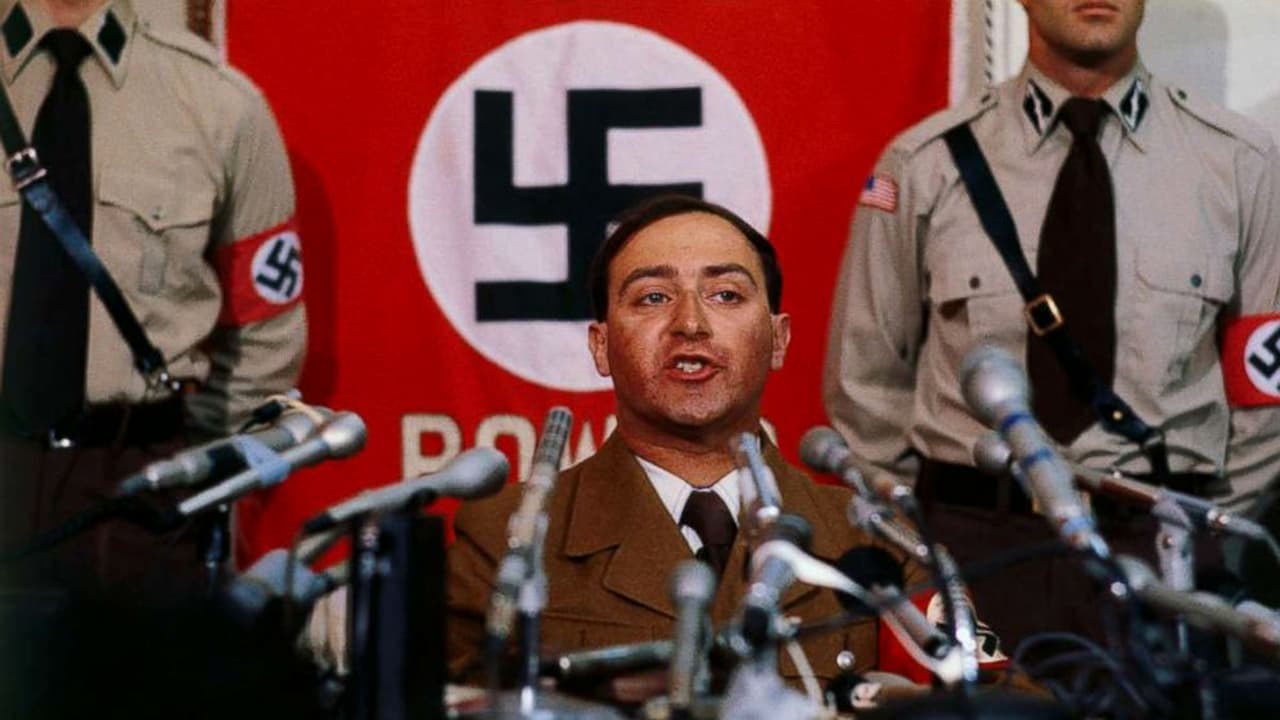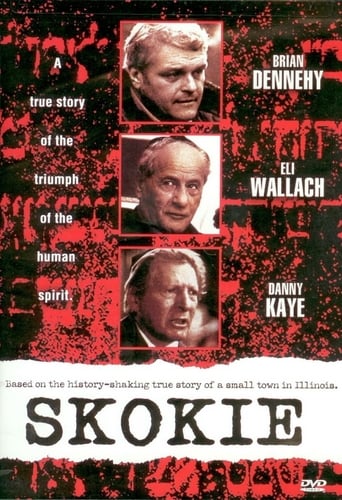Steineded
How sad is this?
Doomtomylo
a film so unique, intoxicating and bizarre that it not only demands another viewing, but is also forgivable as a satirical comedy where the jokes eventually take the back seat.
Anoushka Slater
While it doesn't offer any answers, it both thrills and makes you think.
Ortiz
Excellent and certainly provocative... If nothing else, the film is a real conversation starter.
Jakester
One of the better TV movies ever made about a current political issue. The issues are dramatized vividly - freedom of assembly vs. the rights of a community. The performances are consistently excellent. I would especially cite Danny Kaye, whose portrayal of quivering outrage is one of the great moments of his wonderful career. I was interested to read about the career of the screenwriter, Ernest Kinoy. Among his many credits are a couple of episodes of the excellent short-lived series "The Senator" (part of "The Bold Ones"), very much a "ripped from the headlines" series. So too with this movie.
theowinthrop
In Danny Kaye's career (despite what is said on this thread) he made two dramatic and one half dramatic performances in movies. The half dramatic performance was in the film ME AND THE COLONEL, a comedy with Curt Jurgens based on a play by Franz Werfel, JACOBOWSKI UND DER OBERST (JACOBOWSKI AND THE COLONEL) about a Jew and and anti - Semitic Polish officer fleeing Warsaw in 1941 to avoid death by the Nazis. Though it has funny moments in it, the threat of Nazi brutality, and Jurgens slow change to respect and friendship for the Jewish Kaye actually made the story serious. Similarly Kaye's performance in THE MADWOMAN OF CHALLOT was also serious, as his big scenes dealt with the loss of the individual personalities of the different sections of Paris (as shown in their distinct garbage - he is a rag picker) and in his demonic (no better way of describing it) performance as the symbolic defender of the villains of the piece, on trial for their lives.SKOKIE was Kaye's final movie (not his last appearance on television). It was a major performance - this time in center stage and no clowning involved. It returned to the subject matter of JACOBOWSKI, but brought it up to date.It was based on a notorious incident of the late 1970s in Illinois. A resurgence of the American Nazi Party decided to have a march, and for added interest (as well as putting salt on wounds) it was marching not in Chicago but in a quiet area near the city called Skokie, which was where a large number of Jews - many European survivors and refugees of the Holacaust - lived. The Jews in the community were angered by this move, and fought it. But, after court action, the march was allowed. However, when the Nazis came to march they found hundreds of Jews on all sides of the street glaring at them. They completed the march, but the Nazis were thoroughly unnerved by the experience.Kaye is one of the survivors of the original Nazis and their activities in the 1940s. He is absolutely opposed to this march - he becomes the most outspoken opponent of it. He knows what quiet acquiescence to this garbage means - the Jews in Europe were quiet, too quiet, and it cost six million lives. The pressures of the re-occurrence hits his family, as his wife (Kim Hunter) also a survivor, begins collapsing under the strain - she's reliving the nightmare all over again. She feels it can happen here, and Kaye is determined that it shall not.George Dzunga is the local Nazi leader, who carefully planned the choice of Skokie to give the maximum hurt to the Jews he could. He also chooses the attorneys of the American Civil Liberties Union to represent his "fight for freedom of speech" argument. And to add icing to his evil, he chooses John Rubenstein, a Jewish - American attorney at the A.C.L.U. to be his attorney. Rubenstein and his mentor Eli Wallach are confronting the situation, but determined to do what their organization sees as it's role - safeguard the Bill of Rights against all attacks. And, as I said at the start of this review, they do win the court victory, but the Nazis find the victory more unsettling than they expected.The film also demonstrated something that is not usually discussed when dealing with the A.C.L.U. That organization always pushes the envelope a bit to make it's point about our rights - and sometimes goes beyond common sense. In a mostly secular America, some Christmas crèches don't have to be taken away because they violate church and state (if the A.C.L.U. actually believes in separation on that issue, why not demand that Christmas be returned to a solely Christian holiday rather than allow the courts and government buildings being closed - obviously their membership benefit by the holiday as well - I think they call that hypocrisy?). Inevitably when you are defending "rights" you are going to be tramping on people's toes. Most of us don't mind when it is an unpopular or static group (like a business who has some hiring policy that is questionable), but if you see that a large minority is being insulted by a "rights" issue the A.C.L.U. is involved in, you can see why that organization really needs to reevaluate what it is doing. But it won't.They were defending hate speech here - anti - Semitic material that Hitler would have been proud of. The A.C.L.U. would have said that our right to free speech is universal. But if that is true, the speech is unlimited - and I don't feel that that was the original intention. If the Skokie marchers had been met by thousands of hidden supporters, who were armed and went on a rampage of killing Jews afterward, the fine idea of defending such speech would have been meaningless. And just because it did not happen, does not mean that it can't.The film tackled this as well. Both Rubenstein and Eli Wallach face a double whammy in the course of the story. Both are Jews, and neither really love their client. It's their duty to do what they do for the Bill of Rights. But then the A.C.L.U. coffers suffered. Many Jews had been contributors until Skokie happened - now they felt obliged not to because it was taking a "pro-Nazi" stand. The A.C.L.U. would suffer financially for years for this blunder. Then the Skokie residence countered by a demand to know if the A.C.L.U. was denying the Holacaust occurred (as the Nazis claimed). Although they win the case, they realize they have lost tremendous credibility with former supporters.SKOKIE was a pretty fine movie - and well worth watching. It also leaves the issue of whether Free Speech is unlimited or not open even as the film ends.
moviemystic
He could have his pick of them but this is the only film role Danny Kaye took after a 12 year retirement of sorts.He managed to sandwich in Skokie amid a slew of TV specials, tributes, and various other glorified career retrospectives. It would be his last significant work before the cameras, and it proved to be some of his finest.The subject matter may seem corny or outdated to a young person, but not to anyone who knows the dark side of history the Nazis created.And now here in a land where liberal communist sympathizers had been attacked at every turn for decades by the authorities, the conservative neo-Nazi party was enjoying a blind eye being turned to them. They were allowed to run rampant, particularly in America's East, and specifically in Illinois.The cast, including the late Mr. Kaye, Kim Hunter, Ed Flanders and Lee Strasberg, is excellent and all turn in the fine performances that one would expect of actors of their sterling talent.Naturally the old racist line turns up that goes "the only trouble with Hitler is that he didn't finish the job." But yes, that fact actually did mean not only "trouble" for his party, it meant the downfall of his entire regime - as well as the echoes of it here in America. Do not ignore the past, Skokie is saying, lest our apathy be mistaken for weakness.These days, though, two decades after Skokie was filmed, we're keeping a much closer eye on Oregon than Illinois, but the message is the same - maintain constant vigilance upon those who would hide behind the Constitution in order to further the sickness of bigotry.
Aleona
If you are a lawyer or a judge that is interested in a documentary movie that talks about a case and what happened, this you will like Skokie. There really isn't any great acting in it, in fact a lot of the dialogue of Kaye is cheesy and overly dramaiszed. Most roles are one dimensional and overplayed, but the director did convey the message of the trial and the consequences that followed.If you need to do a report on the Skokie trial, and you want your research to be somewhat entertaining then this movie may serve you a very good purpose, other than that I wouldn't recommend it.

